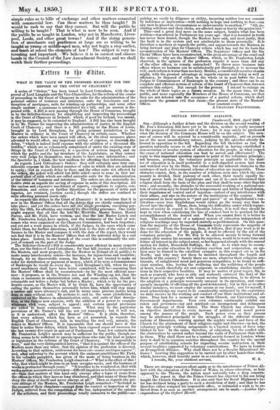SECULAR EDUCATION ALLIANCE • Camberwell, 301/s April 1850.
Sin—Although a further debate and the division on the second reading of Mr. Fox's Education Bill have yet to be taken, neither is really necessary for the purpose of discussion out of doors • for it may safely be Fedicated what the decision of the Commons House ;ill be on the subject. The mea- sure of course will be rejected by a considerable majority, and on grounds too of the most unsatisfactory nature, judging by the speeches already de- livered in opposition to the bill. Regarding the bill therefore as lost. the question naturally occurs to all who feel interested in having established a non-sectarian or secular system of education for the people, in what respect the cause of national education can be be served and effectuated ? The reply to this important (remotion appears to point at the voluntary principle; not because, perhaps, the voluntary principle as applicable to the mat- ter of education is in itself preferable to a well-digested system laid down and watched over by the State, but rather that the inherent obstacles to the existence of such a Government scheme of education are insuperable. Those obstacles consist, first, in the number of religious sects into which the corn- mimity is divided, their jealousy of each other, their nearly equally ba- lanced power both in the Le ature and out of it—each determined that religion shall form the basis o the plan and that shall be none other than his own ; and secondly, the obstacles to the successful working of a national sys- tem of education may be found in the temperament and habits of Englishmen, their impatience ad central and of taxation—indeed of any interference with their affairs, and also in the nature of the institutions of the country. Self- government in local matters is "part and parcel" of an Englishmen's con- stitution—your true Englishman would rather go the wrong way than be forced into the right. These, then, being the difficulties under which regene- rators of society in regard to its education labour, it well they should be kept in view when considering the line of conduct beat to be pursued for the accomplishment of the desired end. When you cannot force it is better to lead. The establishment of a national system of education independent of religious teachings may be regarded entirely as problematical. On this ques- tion the majority of the House of Commons truly represents the majority of the country,. From the foregoing, then, it follows, that if any work is to be done for the education of the people, it must be effected by the aid of the voluntary principle. For Mr. Fox to be allowed merely to bring forward session after session his measure only for rejection, would be to waste time and fritter all interest in the subject away, ashes happened already with the annual motion for Ballot, Household Suffrage, &a. &c. As to what may be accom- plished in secular education by voluntary exertion and coOperation, an opi- nion may be formed in the excellent examples in this respect set us in the North; and why may, not these be imitated throughout the length and breadth of the country ? Surely there are men, whatever their religious sen- timents, of enlightened mind and generous sympathies, to be found in suffi- cient number, who, having the wellbeing and the welldoing of the people at heart, would cheerfully act and cooperate in establishing similar institu- tions in their respective localities. It may be Matter of great regret, Sir, to such as yourself; who have so ably and zealously enforced the duty of the State to provide the people with sound secular instruction, to be driven to the adoption of a principle necessarily unequal in its operation, and conse- quently Incapable of effecting all the good desiderated; but in this as in other similar instances, we must employ the means at our hand ; and for myself; I must acknowledge my regret to be considerably mitigated by the experience we daily receive in the working and conduct of our State institutions and af- fairs. Pray look for a moment at our State Church, our Universities, our Government departments. Your own columns continually exhibit our rulers and governors—lay and spiritual—as incompetent and delinquent in the discharge of their duties. The State Church has always boon an objective institution to every increase of political and moral power among the masses of the people. Such power even as they possess may be attributed principally to the struggles of the different denomi- nations of Dissenters warring against the 'nighty wealth and force of the Church for the attainment of their religious rights and liberties—in fact, the voluntary principle working antagonistic to a bigoted system of force esta- blished by law. In the cause, therefore, of education, let the conflict with the obstructives be carried rather beyond the walls of Parliament than with- in them. Why shall there not be a central society formed in London; whose duty it shall be to organize societies throughout the country for the special purpose of establishing schools for imparting secular instruction in their several localities supported by voluntary contributions. We have in London an Evangelical Alliance. Why shall there not be a Secular Educational Al- liance? Leaving this suggestion to be carried out by abler hands than mine, which, however, shall heartily assist in so excellent a work,
I remain: Sir, your obedient servant, W. S.
























 Previous page
Previous page